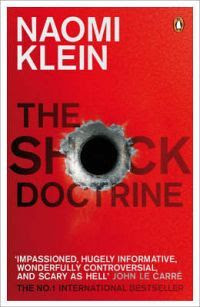
I’ve been reading quite a lot of books lately, as you can probably tell from all the reviews which you can find in the book review category. As with the documentaries I choose to watch, they are mostly about globalisation, consumerism and the abuse of corporate power. These things underlie most of the problems we face today, eg. poverty, pollution, hunger, climate change and waste.
While each of these books is interesting and informative, seldom do you find one book that is brilliantly written, engrossingly interesting and thoroughly researched. The Shock Doctrine is that book. I read Naomi Klein’s first book, No Logo, a while ago. No Logo is widely considered to be the activist’s bible and it whet my appetite for more material on the topic of the effect of corporations on our lives, as well as other related topics. No Logo is the reason I have 10 books in a pile next to my bed, waiting eagerly for their turn to be read.
What has been really interesting is how the books that I have been reading have tied into each other. Through reading books like Confessions of an Economic Hitman and Globalisation and its Discontents, I had developed an idea of what has been happening around the world in the last 50 or 60 years. However, it was The Shock Doctrine that spelled it all out plainly and simply. In fact, Naomi Klein quotes from several of the other books I have read, that is how closely linked they are.
The Shock Doctrine looks at how natural disasters, economic disasters and wars have been used as a cover under which capitalist policies have been put in place. Some may say that capitalism is a good thing and that it is part of a democratic solution. One of the most interesting things I learnt from The Shock Doctrine is that capitalism and democracy seldom go hand in hand. It makes perfect sense, because capitalism generally benefits the wealthy few. In a democratic situation, the poor who do not benefit will outvote the wealthy. It is for this reason that capitalist policies need to be implemented under the cover of shock, often without the knowledge and always without the consent of the people.
There is a chapter on South Africa, which was a real eye opener for me. So much happens in the background that we just don’t hear about. I found it very interesting reading about all the different countries and their economic history. Luckily it ends on a good note, because at times I felt like enlisting as a suicide bomber.
I strongly recommend that everyone read this book. One of the points mentioned in the book is that knowledge and understanding can negate or lessen the impact of shock therapy. The world needs the information in this book so that it can defend itself.
Click this link to purchase The Shock Doctrine from Kalahari.net
Comments
2 responses to “The Shock Doctrine review”
I briefly mentioned the chapter on South Africa in this review. The chapter is very interesting and explains how the ANC gained political power in 1994 but that economic power continued to be held by the World Bank and the International Monetary Fund.
This explains why the ANC Freedom Charter, which the ANC still adheres to, says: “The people shall share in the country’s wealth… The mineral wealth beneath the soil, the banks and monopoly industry shall be transferred to the ownership of the people as a whole…”, and yet nothing like this has happened in the 15 years in which they have been in power.
I stumbled across an article in the Sunday Times written by Ben Turok who has written a book titled: From the Freedom Charter to Polokwane: The Evolution of ANC Economic Policy.
The book would make interesting reading for anyone eager to learn more about this topic. Especially now with the recent calls by the ANC Youth League for nationalisation of the mines.
The article I found also makes interesting reading, giving a brief overview of what has happened with respect to the economic policies of the ruling party:
http://www.thetimes.co.za/PrintEdition/Insight/Article.aspx?id=899746
Perhaps a bit top-heavy in the academic jargon area, but the journal, Mediations, has just published an edition focussed on South Africa, by mainly South African writers. So it could fill out the Klein chapter on SA:
http://mediationsjournal.org/